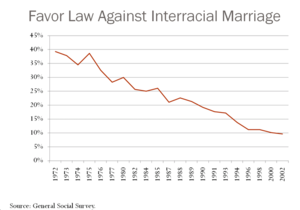Interracial Marriage
Difficulties In Interracial Marriages

The problems encountered by interracial couples are often the result of negative societal attitudes about interracial relationships. Black-Caucasian unions have the lowest frequency of occurrence because of longstanding negative beliefs about these marriages. Studies have indicated that, in general, Caucasians tend to disapprove of interracial marriages, and blacks tend to approve. Other research suggests that people engage in interracial relationships due to self-hate or rebelliousness. In addition, there is some question as to whether or not partners in interracial relationships reciprocate love (Gaines et al. 1999). Given that the dominant culture tends to disdain black-Caucasian unions, it is difficult to imagine how these couples are able to maintain their relationships.
Asian Americans have also experienced difficulties in their interracial marriages. Asian Americans engage in more interracial relationships than any other racial or ethnic group in the United States. Laws forbidding interracial marriages between Asians and Caucasians were common in the United States. For example, in 1901 California extended the 1850 Marriage Regulation Act to include Mongolians (i.e., Chinese, Japanese, Koreans), and in 1933 the law was further extended to include Malays (i.e., Filipinos) (Kitano, Fugino, and Sato 1998). These laws, like all other anti-miscegenation laws, were overturned following a state judicial decision in California (Perez v. Sharp 1948) and a 1967 U.S. Supreme Court decision (Loving v. Virginia). Even though the results of these cases made interracial marriages legal, the negative societal perspective on such unions has been slow to change.
Bok-Lim Kim (1998) points out that since World War II, marriages between Asian women (specifically women from Japan, South Korea, the Philippines, and Vietnam) and U.S. military men have become a legacy of United States military involvement. He notes that many of those marriages took place because of the low socioeconomic status of many of the women who lived near U.S. military bases, and the low self-esteem experienced as a result of their low economic conditions. He also points out that these interracial marriages displayed undaunted courage and optimism in spite of the obstacles they faced due to language and cultural differences and the lack of support from their families and communities in both countries. However, Kim also points out that the Asian women often carry the burden of cultural norms that provide severe penalties for marriage outside their ethnic group (out-marriages). Even though there has been improvement in the acceptance of Asian outmarriages by their families, there continue to be difficulties because of cultural differences.
Interracial relationships and marriages remain controversial for several additional reasons. Many Asian Americans are alarmed because of the rising number of interracial unions, which they believe reduces the pool of eligible men and women who could otherwise engage in same-culture unions. Some Asian Americans are concerned that, because of the high number of out-marriages, distinct groups of Asians may disappear within a few generations. Additionally, whereas so many Asian women are out-marrying, there is the fear that many Asian-American men will remain unmarried because of the dwindling number of available Asian-American women (Fujino 1997). A similar fear is expressed by African-American men and women. As African-American men and women increase their level of education and move to higher economic levels, fewer and fewer members of their race are available for marriage. This often leads to frustration on the part of African Americans who seek to marry someone of their own race, and also leads to increased levels of out-marriage, as increases in income and educational levels occur.
Some of the difficulties experienced by interracial couples are unique and a direct result of the interracial experience. The myths that surround interracial couples can also be stumbling blocks to a healthy marriage. In a study conducted by Richard Watts and Richard Henriksen (1999), Caucasian females report that, when engaged in interracial marriages with black males, they often receive the following messages: "Black men belong with black women because they will treat them better than white women" and "Biracial children will always be referred to as black and, therefore, should have a black mother." The Watts and Henriksen (1999) study also found that problems and difficulties are also experienced because of the mythical messages received from the Caucasian culture. These include: "Black men only marry white women for status symbols or upward mobility," "Interracial marriages do not work; therefore, you will lose your spouse to someone else," "Those who engage in interracial marriages must hate their parents," and "Those who engage in interracial relationships or marriages must have psychological difficulties." The problems faced by couples involved in black-Caucasian unions are also experienced by those involved in other interracial unions. However, many couples state that the reasons they got married are not that much different than same-race couples.
Additional topics
- Interracial Marriage - Reasons For Entering Into Interracial Marriages
- Interracial Marriage - Growth Of Interracial Marriage
- Other Free Encyclopedias
Marriage and Family EncyclopediaFamily Theory & Types of FamiliesInterracial Marriage - Growth Of Interracial Marriage, Difficulties In Interracial Marriages, Reasons For Entering Into Interracial Marriages, Resiliency In Interracial Marriages